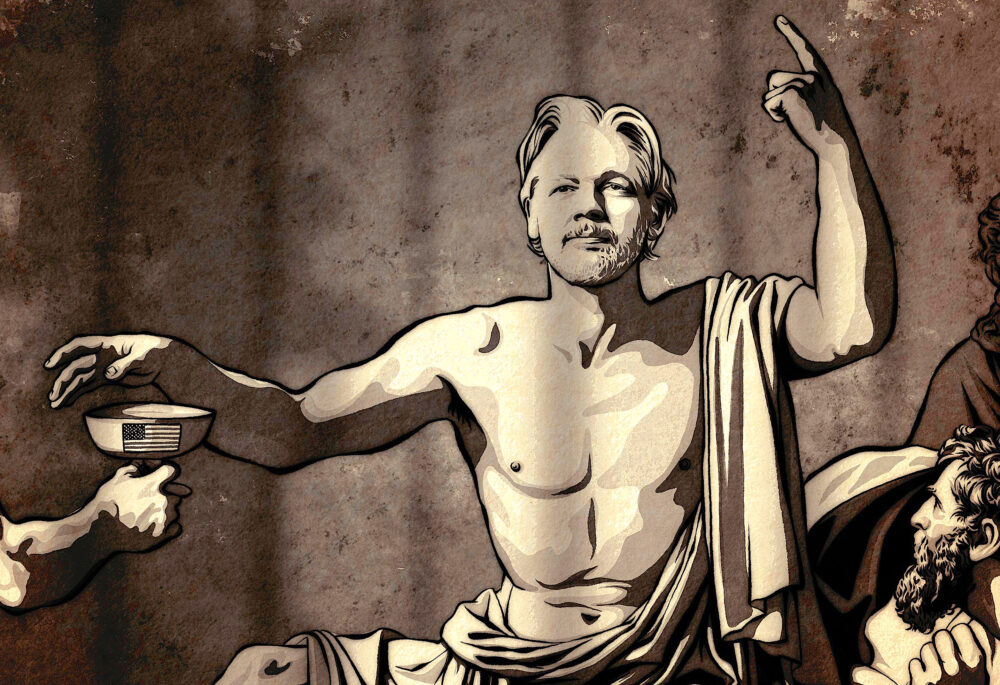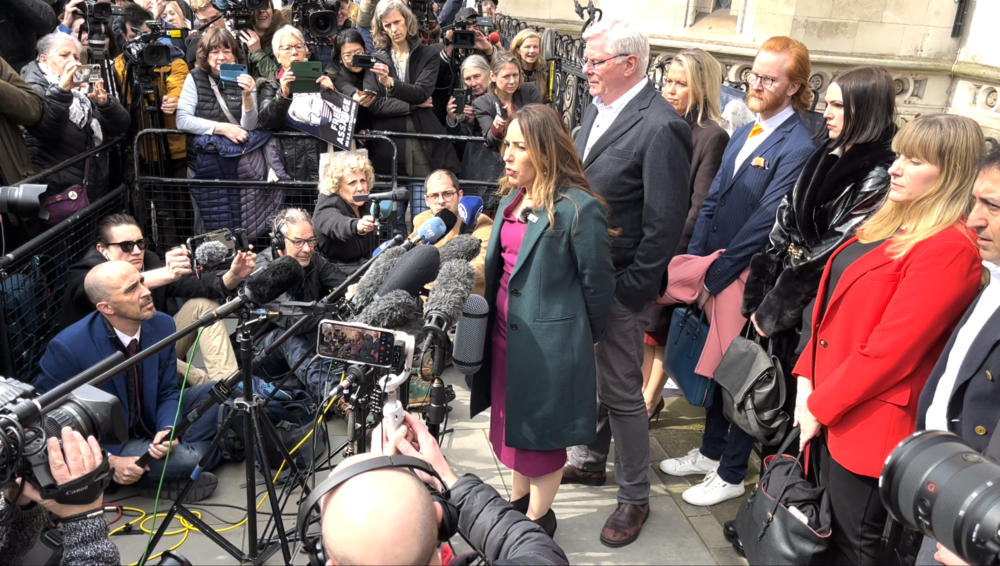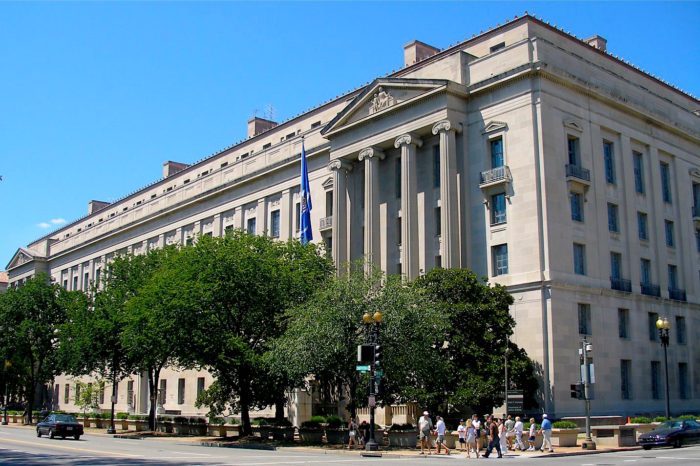The WikiLeaks publisher could have his appeal against extradition heard if the U.S. does not give “satisfactory assurances” of rights and protection against the death penalty, writes Marjorie Cohn.

WikiLeaks publisher Julian Assange is closer than ever to being extradited to the United States for trial on 17 counts under the Espionage Act and one count of conspiracy to commit computer intrusion over WikiLeaks’s 2010-2011 revelation of evidence of U.S. war crimes in Iraq, Afghanistan and Guantánamo Bay. He faces 175 years in prison.
“This is a signal to all of you that if you expose the interests that are driving war they will come after you, they will put you in prison and they will try to kill you,” said Stella Assange, Julian’s wife, of his prosecution.
Last Tuesday, the High Court of England and Wales denied Assange the opportunity to make most of his appellate arguments. But the two-judge panel of Justice Jeremy Johnson and Dame Victoria Sharp left open the possibility that Assange could appeal on three grounds.
They found that Assange “has a real prospect of success” on the following issues: If extradited to the U.S., he will be denied the right to freedom of expression, will suffer discrimination because he’s not a U.S. citizen and could be sentenced to death.
Rather than simply allowing Assange to argue the three issues on appeal, however, the panel gave the Biden administration an out. If the U.S. provides the court with “satisfactory assurances” that Assange won’t be denied any of these rights, his extradition to the U.S. can proceed without an appeals hearing.
Stella Assange called the decision “astounding,” adding, “The court recognized that Julian has been exposed to flagrant denial of his freedom of expression rights, that he is being discriminated against on the basis of his nationality and that he remains exposed to the death penalty.”
At an earlier stage in this case, the U.S. gave the High Court “assurances” that Assange would be treated humanely if extradited. That caused the court to reverse the magistrate judge’s denial of extradition (which was based on the likelihood of suicide if Assange is held in harsh conditions of confinement in the U.S.). The High Court accepted those assurances at face value in spite of the U.S.’s history of reneging on similar assurances.
The current ruling, however, requires U.S. assurances to be “satisfactory” and the defense will have an opportunity to challenge them at a hearing.
“Mr. Assange will not, therefore, be extradited immediately,” the panel wrote, implying that if they had denied his appeal outright, the U.K. authorities would put him on a plane to the U.S. forthwith. They gave the U.S. three weeks to come forward with satisfactory assurances.
If the U.S. fails to provide any assurances, Assange will be granted a hearing on the three grounds. If the U.S. does give assurances, a hearing to decide whether they are satisfactory will occur on May 20.
“The Biden administration should not offer assurances. They should drop this shameful case that should never have been brought,” Stella Assange said to reporters outside the Royal Courts of Justice on Tuesday.
These are the grounds the High Court will review if the U.S. fails to provide “satisfactory assurances”:
1. Extradition Would Violate Freedom of Expression Guaranteed by Article 10 of European Convention on Human Rights
Assange would argue at trial that his actions were protected by the First Amendment to the U.S. Constitution. “He contends that if he is given First Amendment rights, the prosecution will be stopped. The First Amendment is therefore of central importance to his defence,” the panel concluded.
The First Amendment provides “strong protection” to freedom of expression, similar to that provided by Article 10 of the European Convention on Human Rights, the panel noted. Article 10 (1) of the convention says, “Everyone has the right to freedom of expression. This right shall include freedom to hold opinions and to receive and impart information and ideas without interference by public authority and regardless of frontiers.”
Gordon Kromberg, assistant U.S. attorney in the Eastern District of Virginia, where Assange’s trial would be held, said the prosecution might argue at trial that “foreign nationals are not entitled to protections under the First Amendment,” the panel noted. In 2017, then-C.I.A. Director Mike Pompeo said that Assange “has no First Amendment freedoms” because “he is not a U.S. citizen.”
In addition, the U.S. Supreme Court ruled in the 2020 case of Agency for International Development v. Alliance for Open Society International that “it is long settled as a matter of American constitutional law that foreign citizens outside United States territory do not possess rights under the US Constitution.”
The author took part in a CN Live! discussion on the High Court’s ruling:
The panel wrote that if Assange “is not permitted to rely on the First Amendment, then it is arguable that his extradition would be incompatible with article 10 of the Convention.”
But even if the U.S. Department of Justice prosecutors give “satisfactory assurances” that Assange’s First Amendment rights would be protected, that is no guarantee. Prosecutors are part of the executive branch, which cannot bind the judicial branch due to the constitutional doctrine of separation of powers.
“The ruling reveals that the High Court does not understand the American system of government,” Stephen Rohde, who practiced First Amendment law for almost 50 years and writes extensively about the Assange case, told Truthout. “It only has before it the executive branch of the U.S. government. Whatever ‘satisfactory assurances’ the Department of Justice may give the High Court, they are not binding on the judicial branch.”
Moreover, Rohde said, “The High Court is obligated to uphold Assange’s rights to ‘freedom of expression’ under Article 10 of the European Convention on Human Rights, which protects Assange even if the U.S. courts refuse to do so. The only way to do that is to deny extradition.”
2. The U.K. Extradition Act Forbids Discrimination Based on Nationality
Julian Assange is an Australian citizen who would be tried in the U.S. if the Biden administration’s pursuit of extradition is successful.
Section 81(b) of the U.K. Extradition Act says that extradition is barred for an individual who “might be prejudiced at his trial or punished, detained or restricted in his personal liberty by reason of his … nationality.”
Due to the centrality of the First Amendment to Assange’s defense, the panel noted, “If he is not permitted to rely on the First Amendment because of his status as a foreign national, he will thereby be prejudiced (potentially very greatly prejudiced) by reason of his nationality.”
3. Extradition Is Barred by Inadequate Death Penalty Protection Required by the Extradition Act
Section 94 of the U.K. Extradition Act says, “The Secretary of State must not order a person’s extradition … if he could be, will be or has been sentenced to death for the offence” in the receiving state. That limitation does not apply if a written “assurance” that is “adequate” says “that a sentence of death- (a) will not be imposed, or (b) will not be carried out (if imposed).”
None of the charges that Assange is currently facing carry the death penalty. But if extradited to the U.S., he could be charged with aiding and abetting treason or espionage, both of which are capital offenses.
Ben Watson KC, secretary of state for the Home Department, admitted (during a Feb. 21 hearing before the High Court) that:
a.) The facts alleged against [Assange] could sustain a charge of aiding or abetting treason, or espionage.
b.) If [Assange] is extradited, there is nothing to prevent a charge of aiding or abetting treason, or a charge of espionage, from being added to the indictment.
c.) The death penalty is available on conviction for aiding or abetting treason, or espionage.
d.) There are no arrangements in place to prevent the imposition of the death penalty.
e.) The existing assurance does not explicitly prevent the imposition of the death penalty.
The panel noted that when former President Donald Trump was asked about WikiLeaks publishing the leaked documents, he said, “I think it was disgraceful…. I think there should be like a death penalty or something.” If Trump is reelected, he may seek to ensure that his Justice Department adds capital charges to the indictment.
In concluding that Assange could raise this issue on appeal subject to “satisfactory assurances,” the panel cited “the potential, on the facts, for capital charges to be laid; the calls for the imposition of the death penalty by leading politicians and other public figures; the fact that the Treaty does not preclude extradition for death penalty charges, and the fact that the existing assurance does not explicitly cover the death penalty.”
Appeal Grounds Denied by Panel
Remaining grounds for appeal that Assange requested were denied by the panel. They include prosecution for a political offense, prosecution based on political opinion; violation of right to a fair trial; violation of right to life; and violation of right to be free from torture and inhuman or degrading treatment or punishment. In addition, since no publisher has ever been prosecuted under the Espionage Act for publishing government secrets, Assange could not have known it was a crime.
The panel also ruled that Assange could not introduce new evidence adduced after the magistrate judge’s ruling. This includes a Yahoo News report detailing the C.I.A.’s plan to kidnap and kill Assange when he was living under a grant of asylum in the Ecuadorian Embassy in London.
If the U.S. offers “satisfactory assurances” and extradition is ordered, Assange could appeal to the European Court of Human Rights and raise these additional issues as well.
Meanwhile, there is a possibility that instead of filing “assurances,” the Biden administration will opt to avoid the political pitfalls of Assange’s extradition to the U.S. and offer a plea bargain to end the case.
Copyright Truthout. Reprinted with permission.
Marjorie Cohn is professor emerita at Thomas Jefferson School of Law, former president of the National Lawyers Guild, and a member of the national advisory boards of Assange Defense and Veterans For Peace, and the bureau of the International Association of Democratic Lawyers. She is founding dean of the People’s Academy of International Law and the U.S. representative to the continental advisory council of the Association of American Jurists. Her books include Drones and Targeted Killing: Legal, Moral and Geopolitical Issues.




Politicians are the most assailant customers of lip services. Nothing that comes out of their mouths is their own opinion. Everything they say is a washed fabrication of events and projections that serve their interests in influencing the public’s opinion.
I wonder if the court isn’t setting it up to get themselves, and the UK government, off the hook by drawing the US prosecution into an impossible trap where it cannot provide ironclad assurances simply because it cannot force the judicial branch to honour any such assurances.
“Prosecutors are part of the executive branch, which cannot bind the judicial branch due to the constitutional doctrine of separation of powers”.
This would allow Assange’s defence to point out the worthlessness of the assurances, and allow the judges not to accept them – and then allow Assange to appeal.
There is also the issue of how the US can grant Assange citizen rights under the First Amendment when “it is long settled as a matter of American constitutional law that foreign citizens outside United States territory do not possess rights under the US Constitution.” .
This poses another problem for the US prosecutors.
Then there is the political issue of potentially significant negative publicity if the US does extradite him right at a critical point of the election cycle where Biden is doing so badly. It could have a big effect on his already dwindling chances of re-election. He probably doesn’t want that problem right now.
WillD, wish the UK judges would see the “worthlessness” in
US assurances, but John Kiriakou has pointed this out to
them and true to their CIA subservience, they’ll accept
whatever they’re told by American handlers.
I too wish there was a hope, but maybe now just a prayer
Key phrase: “not to be immediately extradited” and that’s because
the CIA, in control of UK and US judges, don’t want public attention
turned to a tortured and shackled publisher messing up Biden’s re-election.
Thanks Craig Murray.
“Assurances”? He didn’t do anything but embarrass and disclose war crimes. His conviction should sink Biden’s boat, whether it will remains to be seen.
Why do we care about US assurances ? These people are not reliable at all !
We should do everything to free Assange and certainly not send him to the US !!
U.S. Government assurances? What a cruel joke. U.S. promises whether written or unwritten, even its formal treaties and signatures on formal agreements are virtually worthless. Ask the Indians (100% of treaties broken and subsequent genocide). What about its nuclear weapons agreements and treaties with the Russians? All broken or abrogated. What about NATO’s “Not one more inch?” What about Minsk I & II wherein it was revealed that there was no intention whatsoever to honor? What about the Paris Climate Agreement? Nope. Any assurance from the U.S. is as good as broken before the ink dries.
Are we to believe that the UK courts are able/willing to differentiate between a US death
sentence by say, electric chair, as opposed to one rendered by a New World dungeon worse than Belmarsh?
It is a utterly pathetic situation when the USA is incapable of giving “satisfactory assurances” on anything and the British judiciary is a joke. That it has come to this.
Could it be that the forthcoming hearing is but a formality with a forgone conclusion that is not in favour of the defendant?
If Biden thought pardoning Assange would help his re-election, he would do that or anything to win more votes
We already have 2 criminals that harm the US. Those would be Lying Trump and Brain dead Biden, lackey to Netanyahu. Julian Assange is a truth teller, but sadly most of the American government is not. We can’t have that “more perfect union,” with so many parts of the US government who are so committed to lying.
And too —Biden, did you miss that part of the Preamble which states, “Establish Justice,?” And by the way Biden, Netanyahu murders any Palestinian that breathes! WHY you stupid man is Netanyahu—a liar and murderer— given safe passage by you—But a TRUTH TELLER like Julian Assange is not.
What a disappointment you are Joe Biden. You’ve fallen down a lot Biden—-do it again—but this time don’t get up.
Only fools would believe any ‘assurances’ coming from the US. Even with their mouths closed…they lie.
This article and the recent article by Murray are both informed, irrefutable and convincing to the point that the only conclusion to be drawn is that the British judicial system has been corrupted. There is the “Law” and there is “Justice”. A judge must first consider and apply “the Law”. In this case there appears there was no attempt to address the law and failed to address to even consider “The Justice”. It seems clear in handing down its ruling the Judges have ignored critical facts and ignored “The Law” and failed to administer “Justice”.
I am happy not to be a British citizen or a British subject but also not “happy” to be an Australian.
jack
Ask Vladimir Putin what he thinks about American “assurances”. Not much. And I agree with him. People seem not to grasp what shipping him to the U.S. will mean. He will be assassinated and then they will declare that anyone who publishes the truth about corruption and war crimes will also be killed. This is not “freedom” or “democracy”. I speak as an American citizen who is outraged by the destruction of my country by its own government.
Agreed. United States officials will make sure that Julian Assange is killed, put to death medically, whatever is convenient for US politicians while his family will be lucky if they get any of the human remains of Julian Assange returned. Nobody in their right mind would give custody of anything to the public pretenders that go by names like UNITED STATES unless you want it killed, put to death.
Marjorie as usual is very clear and helpful with this report.
So far the various discussions indicate the extradition can be slowed but not stopped. The slowing is said to be desirable for Biden’s election chances due to the storm that would arise over the first amendment issue etc. if he arrives in the US ahead of November. But is this assessment accurate for much of the country versus Julian supporters? Much depends on what election value would come from capturing him here in the US and doing so soon. There is a view that he should be treated the same as a prisoner at Guantanamo, and that this is where he should be put and subjected to treatment as with the most hated prisoners previously. This is the Trump crowd view so getting him here before November actually might help Biden’s chances with these people.
Clearly, the “assurances” (which will be provided) must be attacked as inadequate as with the separation of powers argument, by which the assurance of avoiding the death penalty will not be allowed due to the prevailing public feeling that Assange is a spy, not a hero and deserves execution. The discussion in support of Assange tends to assume everybody knows and agrees with the valuable service he provided as a truth-teller on US criminal behavior and harm done, but this stands in contrast to the view he is a rat bastard spy and enemy of the country, not a truth-teller on what citizens should know. So, I think, more attention somehow, attacking this view and asserting that he is the victim, needs more attention. With more controversy the case will be slowed further and hopefully can be transferred to another hearing at the European Court of Human Rights.